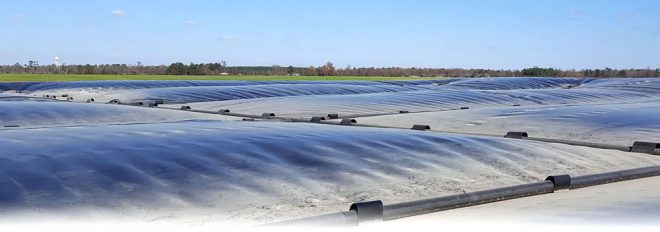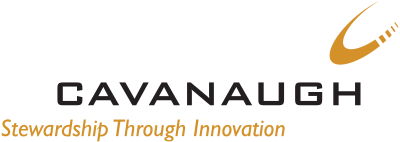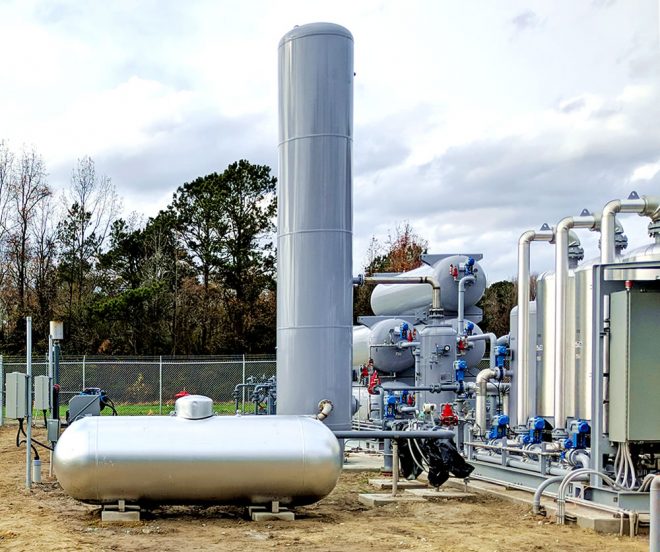 The June 2018 featured article in Biocycle Magazine is the Optima KV project. The article is written by Craig Coker , a Senior Editor at BioCycle. The project is hailed as the newest renewable energy project to come on line in North Carolina. The article accurately describes how Optima KV is capturing the manures from several Smithfield farms and refining it to make Renewable Natural Gas. The in-ground anaerobic digesters, pictured above that cover the lagoons at each farm are made of high-density polyethylene (HDPE) liners. The waste from the pigs at each farm is flushed into the digesters. Each farm is outfitted with a low-power compressor that pulls the biogas from beneath the covers, filters it to remove particulates, and removes the moisture through a condenser. The preconditioned biogas is routed to a central gas clean-up facility on Smithfield Foods’ property (about 3 miles distance from the farms) through low-pressure piping. Each farm is equipped with emergency flares if there is an operational issue with the central facility. The BIG NEWS here is that is the first project to put Renewable Natural Gas in the pipeline in the whole state.
The June 2018 featured article in Biocycle Magazine is the Optima KV project. The article is written by Craig Coker , a Senior Editor at BioCycle. The project is hailed as the newest renewable energy project to come on line in North Carolina. The article accurately describes how Optima KV is capturing the manures from several Smithfield farms and refining it to make Renewable Natural Gas. The in-ground anaerobic digesters, pictured above that cover the lagoons at each farm are made of high-density polyethylene (HDPE) liners. The waste from the pigs at each farm is flushed into the digesters. Each farm is outfitted with a low-power compressor that pulls the biogas from beneath the covers, filters it to remove particulates, and removes the moisture through a condenser. The preconditioned biogas is routed to a central gas clean-up facility on Smithfield Foods’ property (about 3 miles distance from the farms) through low-pressure piping. Each farm is equipped with emergency flares if there is an operational issue with the central facility. The BIG NEWS here is that is the first project to put Renewable Natural Gas in the pipeline in the whole state.
This project is improving waste management treatment systems in our state, as the digesters remove pathogens, vectors, odors and contaminants that would otherwise sit in the lagoons. Smithfield is a leader in advancing waste management solutions, as the top hog producing counties in the country are in Eastern North Carolina, they have worked hard to be a part of this innovative treatment solution. Not only is utilizing waste to make energy ingenious, the aggregation of wastes from several farms improves the cost efficiencies. This project right here in Eastern North Carolina is pioneering the way for natural gas interconnections across the state and country. To read the full article, follow this link:
The Optima KV Gas Upgrading System
Optima KV
Optima KV is a collaborative venture between Smithfield Foods, two local swine herd farmers, engineering firm Cavanaugh Associates, and outside investors to make Renewable Natural Gas (RNG, also called biomethane). Manure is pumped from the animal barns into a HDPE-lined and covered in-ground digester at each of the five contiguous farms housing 60,000 pigs owned by the two farmers. These digesters vary in capacity from 1.7 million to 3 million gallons. In the event of operational issues with the digesters, a gravity emergency spillway will redirect the manure back to the original wastewater lagoon. The digesters are mixed with liquid re-circulation pumps, which can also be used for sludge removal from the digesters. The digesters are equipped with internal baffles that help separate solids and liquids so the hydraulic residence time for the liquid fraction is about 30 days, while the solids residence time is about 90 days.
Biocycle REFOR is coming to Raleigh in October, and Optima KV will be one of the bioenergy tours. For more information, follow this link:
The gas upgrading system (GUS) at Optima KV consists of pressure-swing absorption to remove CO2, H2S and other constituents. Cleaned biomethane is pressurized to be sold to Duke Energy via its subsidiary, Piedmont Natural Gas.
This quote from Gus Simmons is directly from the article:
“We see directed biogas in eastern NC as having a lot of potential,” says Gus Simmons, Director of Bioenergy for Cavanaugh LLC and manager of the Optima KV project. “We built GUS with extra capacity, so we have the opportunity to connect more swine farms in the future. As biomethane can be used for any purpose currently met by fossil fuel natural gas and because Renewable Identification Numbers and state-based renewable energy credit programs do not require the specific molecules of biogas to be used by specific users, we see great opportunities for the North Carolina swine industry to export farm-based energy across the country.”


